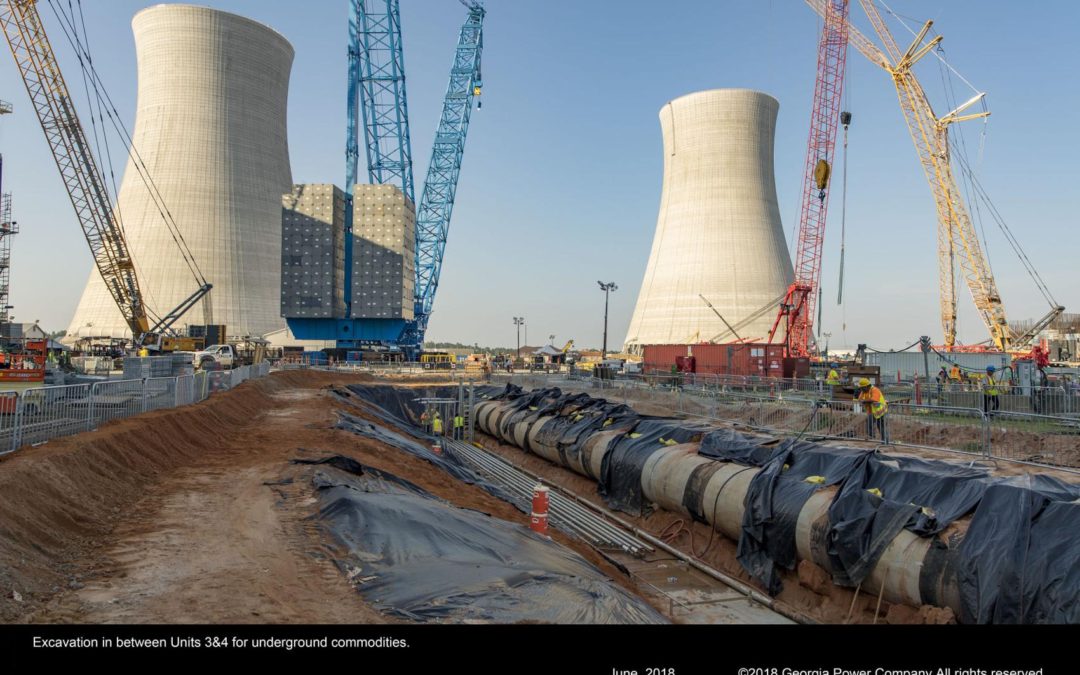from mdjonline.com
Progress on the two new Plant Vogtle nuclear reactors are set to continue after the three primary owners reached an agreement following days of debate and public bickering.
“We are all pleased to have reached an agreement and to move forward with the construction of Vogtle Units 3 & 4 which is critical to Georgia’s energy future,” said the co-owners in a statement. “While there have been and will be challenges throughout this process, we remain committed to a constructive relationship with each other and are focused on reducing project risk and fulfilling our commitment to our member-consumers.”
The project’s three largest stakeholders are Georgia Power, which owns 45.7 percent, the Municipal Electric Authority of Georgia or MEAG, which owns 22.7 percent, and Oglethorpe Power, which owns 30 percent. Dalton Utilities owns 1.6 percent.
The owners came to an agreement Wednesday to continue work on the $27 billion towers, which were originally projected to cost $9.5 billion and set to be completed in 2016. The current estimated time of completion is 2022.
A vote was triggered after an additional $2.3 billion budget increase was projected in August. In order to move forward, 90 percent of the owners had to agree, which meant all three owners needed to vote yes. At the last minute, after Georgia Power and MEAG had voted yes, Oglethorpe released what it called a “conditional yes” vote.
Oglethorpe said it needed assurances the costs would not continue to rise. They wanted a freeze on the budget following the $2.3 billion increase.
The other owners issued press releases criticizing Oglethorpe, claiming it was reneging on agreements it made and putting 7,000 jobs at risk, charges Oglethorpe denied.
The owners burned through several self-imposed deadlines before announcing their agreements.
In the statement, the companies said: “In connection with the votes to continue construction, all four of the co-owners agreed to finalize and execute definitive agreements which helps mitigate financial exposure for each of them.”
TERMS AND CONDITIONS
A budget cap was not part of those agreements, but Georgia Power did promise to take on more of the costs in case of another budget increase.
If costs go up by between $800 million and $1.6 billion, Georgia Power will be responsible for 55.7 percent of the money, with the rest to be split between the other owners based on the size of their stakes.
If the costs go up by between $1.6 and $2.1 billion, Georgia Power’s share will increase to 65.7 percent.
If the price tag goes any higher than that, “each of the other Vogtle owners would have a one-time option to tender a portion of its ownership interest to Georgia Power in exchange for Georgia Power’s agreement to pay 100% of such Vogtle owner’s remaining share of construction costs in excess of the (estimated cost at completion) … plus $2.1 billion.”
The documents also specify that if the reactors become operational earlier than expected, Georgia Power will receive more than its share of the cost savings.
In addition, the agreement also includes a safeguard in case the situation in which 90 percent of owners cannot agree to move forward arises again. In that event, if more than 50 percent of owners want to move forward, work will continue for 30 days while they hash it out. If they don’t reach an agreement in that time, the project will die and the cost of construction during those 30 days will be paid by those who voted to continue.
MEAG
MEAG, which provides electricity to communities including Marietta and Acworth, is involved in lawsuits against the Jacksonville, Florida-based utility company Jacksonville Electric Authority (JEA).
In 2008, MEAG entered into an agreement with JEA, under which JEA would get a certain amount of energy for the first 20 years of the plant’s operation in exchange for paying toward construction costs and their share of power. But JEA wants out of that agreement following the cost and construction overruns, and the two are suing each other in Georgia and Florida.
Under the plan approved Wednesday, if JEA prevails and MEAG is forced to pull out, Georgia Power will agree to pay MEAG up to $300 million.
MEAG President and CEO Jim Fuller praised the agreements in a statement following the vote.
“We entered into this project knowing there would be construction risk but also knowing that developing these units was the best option if we wanted to reduce our carbon footprint and hedge against future carbon costs and increased natural gas prices,” he said. “Prior to today’s agreement, MEAG Power had already taken several steps that will mitigate the impact of those increased costs, which is one reason our Board voted unanimously to proceed with construction. Today’s agreement includes significant additional safeguards that validate the wisdom of that vote.”
